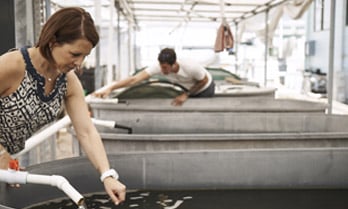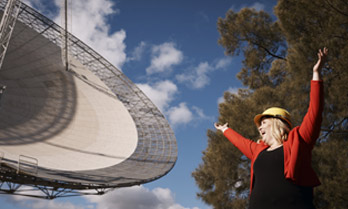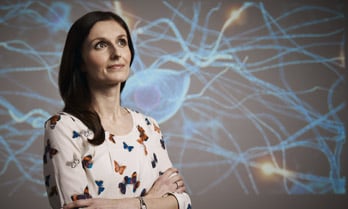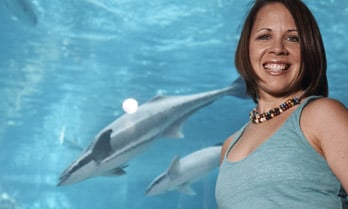







20 November 2017
In 2017, the Australian L'Oréal-UNESCO For Women in Science program launched a mentoring scheme, in which the FWIS Alumni (past and present Fellows) became mentors to passionate and ambitious PhD students.
We are incredibly proud of our Fellows who have established themselves as exceptional researchers, communicators and leaders within their scientific fields and therefore have acquired a wealth of knowledge and experience. We know how important it is for female role models and champions of change to exist to inspire and instil confidence into other women, especially in the early stages of their career.
By fostering a mentoring scheme where our Fellows can share advice and guidance to budding female scientists, we aim to provide an invaluable opportunity to develop integral knowledge and skills, and to instil passion and a sense of empowerment into our future women leaders.
In 2017, fourteen female PhD students from around Australia participated in our Mentoring program as Mentees. With monthly meetings with their Mentor, and regular forums with the For Women in Science Team and other Mentees, this program provided both a critical learning and support network for our mentees.
These young women are at a critical point in their professional education and learning, and we are very proud to be able to provide support them as they transition into the next phase of their scientific career. Meet our mentees and read about their experience below:
4th year PhD Candidate
Scientific discipline: Engineering & related fields
“It rarely comes to my mind that I can ask for advice and help until I am reminded by other people. It is always important to hear different points of views in life and at work.”
2nd year PhD Candidate
Scientific discipline: Medical Sciences & Health
“While I have mentoring from my supervisors and immediate peers, perspectives from others in different organisations are extremely valuable.”
2nd year PhD Candidate
Scientific discipline: Medical Sciences & Health
“I would like to learn from a mentor and their experience, especially in areas such as priority setting to use my time optimally, negotiating skills, teaching, grant writing and strategic planning.”
3rd year PhD Candidate
Scientific Discipline: Medical Sciences and health
“I believe by gaining insightful perspectives from mentors and being coached on better ways to manage my time, I can significantly improve my overall work ethic, efficiency and productivity.”
4th year PhD Candidate
Scientific discipline: Natural & Physical Sciences
“A critical area I wish to develop is the effective communication of complex scientific concepts, finding and their relevance”
3rd year PhD candidate
Scientific discipline: Medical Sciences & Health
“I would love to learn the art of negotiation, especially as I start to look at post-doctoral fellowships.”
2nd year PhD Candidate
Scientific discipline: Medical Sciences & Health
“I am highly motivated, driven and enthusiastic. I would like assistance from a mentor to look at the big picture in regards to career path, opportunities and what is realistic and manageable.”
3rd year PhD candidate
Scientific discipline: Medical Sciences & Health
“I would like to develop the art of negotiation so that I can learn how to get maximum benefit from any collaboration or funding opportunity.”
3rd year PhD candidate
Scientific discipline: Medical Sciences & Health/Information technology
“I would greatly appreciate a mentor who has had many experiences in communicating their research or other projects to audiences, and who can guide me to become a better presenter.”
3rd year PhD candidate
Scientific discipline: Natural & Physical sciences
“A suitable mentor may have advice on techniques to keep track of my progress across the multiple components of my PhD, whilst keeping in mind the bigger picture of how these components will tie together into a coherent piece of research.”
4th year PhD candidate
Scientific discipline: Natural & Physical sciences
“It’s certainly not easy to be an academic/scientists and a mother at the same time and if I had the opportunity to receive advice or guidance from a fellow mother and woman in STEMM it would certainly boost my confidence to think that it can be done successfully.”
3rd year PhD student
Scientific discipline: Natural & Physical Sciences
“It takes time and effort to establish professional networks and that is where I think a mentor with experience in professional communication skills can help me excel to build a more global presence for my work.”
3rd year PhD Candidate
Scientific discipline: Medical sciences & Health
“I believe that this Mentoring scheme will be a fantastic and stimulating opportunity on both an academic and personal level, inspiring me with confidence, especially in the early stages of my career.”
3rd year PhD Candidate
Scientific discipline: Medical Sciences & Health
“I would like to develop my public speaking and presentation of my research, and possibly improve my professional confidence.”
Combating this gender inequality is both a national and global priority of the For Women in Science program, and we are always striving to develop the program in order to provide more tools and resources to help women become our future leaders, as part of a larger cultural change.